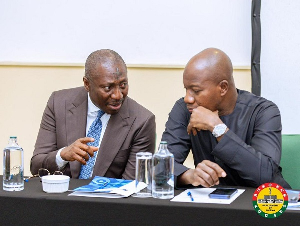"Transparency works both ways and it is for the company as well as the countries -- their people need to know and the more they know what is being done for their benefit, the more they will be supportive." - Ngozi Okonjo-Iweala, World Bank's Managing Director
Ensuring transparency in the extractive sector has never been a real priority of the state authorities of Ghana and commercial entities. As a result, the operation of the sector remains insufficiently transparent. It has always been the truth that the failures of oil-producing economies are legion and continuous. Ghana, considering recent developments, is becoming oblivious of the fact that success of oil is measured by poverty reduction rather than barrels of oil produced or millions of dollars received from oil exports. Reports which border on attempts by the members of the Parliamentary Select Committee on Mines and Energy to amend and cancel Clauses 58 and 60 respectively of the Ghana Petroleum Revenue Management Bill and the purported use of the country’s oil reserves as collateral are clear indication Ghana is teetering on the brink of the resource curse. There is danger looming!
Best Practices in Petroleum Revenue Management
The Ghana Petroleum Revenue Management Bill, as it stands now, addresses many of the Santiago Principles relating to transparency, including a public definition of the rules and procedures of the Funds and the publication of annual reports and other relevant financial information. It also meets many of the criteria laid out by Edwin Truman of the Peterson Institute for International Economics for Best Practices in sovereign funds, including the publication of performance against benchmarks and the annual returns on the fund. What provisions in the bill enables it to meet these international best practices?
To begin with, Section 51(3) of the PRMB narrows the Minister’s discretion to declare information confidential which hitherto gave much power to the Minister. The earlier provision gave power to the Minister to declare information confidential if the Minister deems it to “be misleading, as it relates to … incomplete analysis, or significantly affect the functioning of Government”. Presently, information is only permitted to be withheld if disclosure could “prejudice significantly the performance” of the Fund. The current Bill also puts in a requirement that Parliament approves any Ministerial declaration of confidentiality, and specifically clarifies in 51(5) that such a declaration “shall not limit access to information by Parliament and the Public Interest and Accountability Committee.”
The other very important provision has to do with the existence and expanded mandate of the Public Interest and Accountability Committee. Instead of exclusively advising Parliament, the Committee is charged with monitoring compliance with the Act, creating the space and platform for public debate on “whether spending prospects and management of revenues adhere to development priorities,” and providing independent assessments to help Parliament and the executive in the oversight and performance of revenue management programs (Section 54).
It must be stressed that any attempt to scrap the existence of the Public Interest and Accountability Committee and amend any of the articles that empower the local people to hold leaders into account should be seen as a sharp contravention of the principles of human rights. In other words, Ghana would be preparing a viable ground for corruption to thrive. It is important Ghana learns from other oil-producing countries that corruption has brought nothing but complete devastation. Corruption happens to be the greatest threat to any economy wishing to ensure sound and prudent revenue management. The World Bank defines corruption as the "abuse of public power for private benefit". Transparency International also takes a broader approach: "the misuse of entrusted power for private gain". Considering these definitions, there is little evidence to suggest that Ghana could effectively fight corruption when transparency provisions in PRMB are treated with contempt.
Exposition on Transparency
Transparency is widely considered an important prerequisite for establishing proper institutional and regulatory structures, and for creating the conditions in which abuses can be challenged. Transparency is undoubtedly important for addressing corruption in oil rich countries. Countries that have disregarded the significance of transparency have actually been culprits in devastating corruption cases, rent seeking, increased civil wars due to mistrust and chronic poverty. It is unfortunate that members of the Parliamentary select Committee on Mines and Energy is seeking to amend Clause 60 (1) which states that “The records of petroleum receipts in whatever form for the purpose of transparency and accountability shall simultaneously be published by the Minister in the Gazette and in at least two national daily newspapers, no more than thirty working days after the end of the applicable quarter.” This provision is the exact tool that could empower the people to scrutinize how their revenues are used. It is therefore detrimental to the rule of law if this particular article is amended.
Let’s consider gruesome examples of grand corruption that have occurred in some oil producing states. A 2004 US Senate report detailed how US oil companies made millions of dollars in questionable payments to relatives and friends of President Teodoro Obiang of Equatorial Guinea, which “may have contributed to corrupt practices in that country”. The report offered a detailed examination of how oil companies operate in an economy where many businesses are dominated or controlled by government officials, their families and other associates. This economic dominance, the report added, resulted in foreign companies having to provide those in positions of authority with “lucrative returns” on oil investments.
In 2003, three key executives of the former French state-owned oil company, Elf, were jailed for up to five years for their involvement in corruption. The three were among 37 defendants on trial for illegally siphoning off €350m in company funds from 1989 to 1993. Much of this money was paid out in royalties to African politicians in Angola, Cameroon, Congo-Brazzaville and Gabon. The payments were aimed partly at guaranteeing that it was Elf - not US or British firms – that gained access to these countries’ oil resources. At one point, Gabon alone accounted for 75% of Elf’s profits.
The Parliamentary Committee on Mines and Energy is postulating the situation that Parliament alone can deal with corruption that may arise in the utilization of the oil revenues. This is wrong. That challenges that oil revenues present are numerous that one institution cannot efficiently tackle. Ghana should not underestimate the ravaging impacts of grand corruption.
The existence of the Public Interest and Accountability Committee should be empowered to provide the level playing field where the local people can engage and hold leaders accountable. It is important to stress that the mounting calls for openness in oil production agreements are not only justifiable by law but also recipe for prudent oil revenue management and sound practices in the extractive industries. I have to the simple conclusion that a key ingredient for harnessing oil for the real benefits of ordinary citizens is a well informed society. This can be made possible by the work of the Public Interest and Accountability Committee. Increased access to information and transparency embolden the citizenry to demand what is rightly theirs.
Apart from disclosing revenue expenditure, Ghana should endeavour to make contracts signed with oil companies open to the general public. On October 31 this year, citizens of Niger voted on a new constitution that includes extraordinary assurances of transparency in the natural resource sector. The new constitution, which was approved by an overwhelming 90% margin, includes strong protections for transparency and development that, if enforced effectively, will bolster public oversight and the accountability of the country's crucial mineral and petroleum activities. Furthermore, among the key provisions is Article 150, which requires the publication of natural resource contracts as well as national resource revenues on a disaggregated, company-by-company basis. These mandated disclosures will ensure that Nigeriens have access to thorough and detailed information on state benefits from natural resources.
Conclusion
Lack of transparency in the oil sector will encourage corruption and breeds unnecessary mistrust that could intend spark confusion and the worse of it all civil war. These are apt to destabilize the economy. It is ethical that the tenets of transparency as embodied in Clauses 58 and 60 be safeguarded at attempts to elude the grips of the resource curse. Ghana, being touted as the beacon of modern democracy, has no excuse to renege on these simple responsibilities that bring utmost benefits to good governance and poverty reduction efforts. If Niger has taken this landmark step, what prevents Ghana from following suit? Ghana’s poor performance in the 2010 Human Development Index (ranked 130th under low human development with 0.467) should compel the country into increasing transparency in revenues and contracts. Decades of gold mining has brought nothing beneficial and there is every indication things will repeat in the oil sector. It should be known that the success of Ghana’s oil will be measured by the reduction of poverty (Human Development Index) and never the barrels of oil produced.
The author, Stephen Yeboah is a freelance writer and the National Co-ordinator for Osagyefo Network for Rural Development (OSNERD), an NGO based in Kumasi [email: stephenyeboah110@yahoo.com]
Opinions of Monday, 22 November 2010
Columnist: Yeboah, Stephen














